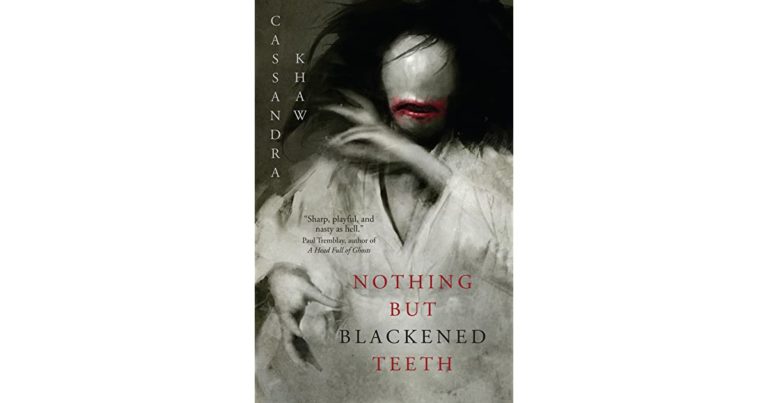Review of Nothing But Blackened Teeth
Tor Nightfire. 2021. 128 pages.
Nothing But Blackened Teeth is a haunted house story dripping in blood and originality. The dark tale takes place inside an ancient abandoned Japanese mansion. Like all good haunted houses, this one has a long guestbook full of dead people. The Heian-era mansion has the bones of human sacrifices folded into its walls. These sacrifices make good company for a dead bride forever awaiting the return of her late husband. A group of friends decide to rent out the mansion to celebrate their friend’s marriage. However, the time for celebration abruptly becomes a time of terror and fear when the dead appear to be alive. The story’s originality comes from Khaw’s sharp focus on Japanese folklore and culture.
Khaw is able to do so much with so little in this tale. There are only a handful of characters, and while some are archetypal, they each have their complexities. The five friends, Cat, Phillip, Lin, Faiz, and Nadia, have long histories with each other and more than a little bad blood. More than friends, they are like family. They love each other but don’t like each other too much. I didn’t have a favourite character. In fact, I didn’t find any of the characters very likable. They are too petty and angsty for my taste. They hold on to grudges too tightly, and overall the group has terrible communication skills. What makes up for my dislike of the group is the tension between them. The nasty bickering is paired well with their good intentions. They want to make amends and they want to rekindle their friendships. They just chose the worst place to do it.
Khaw plays with language in a very visual way, and it’s her writing style that makes this story so enjoyable. An excellent example of this is when Khaw writes, “the architecture had dulled its heartbeat so it could hear me better, the wood warping, curling around the room like it was a womb, and I was a new beginning. Dust sighed from the ceiling. Spiderwebs fell in umbilical cords” (14). Her visual writing is perfect for the horror genre in its grotesqueness and sense of foreboding. She personifies the house until it feels alive and predatory — the setting itself becomes the villain.
With shows like Squid Game and the film Parasite being massive hits, we are starting to see more Asian cultures represented in the horror genre. Khaw drenched this book in Japanese culture, from the drinks to the demons. I was constantly punching Japanese words into Google translate — words like “umami”, which is Japanese for the essence of deliciousness. The cultural aspect of this novel makes the story so vibrant. It feels like some sick and twisted travel literature.
It’s hard to be both a horror fan and a feminist. The history of this haunted mansion had hundreds of women sacrificing themselves in the hopes of one man’s return. How many young girls’ lives needed to be cut short for a guy who couldn’t keep his shit together? Thankfully, Khaws’ ending strays away from that tradition, and she manages to avoid the final girl trope. However, the two female characters in this novel are fighting over one man. That sexist cliché makes it hard for me to deem this story a win for feminists. Despite the lack of a feminist edge, Nothing But Blackened Teeth is still offering something original to readers.
I read a lot of stories about ghosts and haunted houses. Unfortunately, some get lost in the fog and the spiderwebs of my memory. But this story sticks out. Kassandra Khaw’s Nothing But Blackened Teeth will be the one that haunts my thoughts later when I am riding the bus, or cutting up vegetables, or making human sacrifices.

